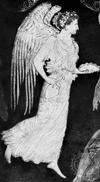Hebe — may refer to: *6 Hebe, one of the largest main belt asteroids *Hebe (mythology), the goddess of youth in Greek mythology * Hebe (plant), a genus of plants native to Oceania * Hebe , a sculpture by Antonio Canova *Hebe (1860 1877), one of the… … Wikipedia
Hebe — ist: der Name einer griechischen Göttin, siehe Hebe (Mythologie) ein Reizwäsche Kleidungsstück, siehe Büstenhebe der Name eines Asteroiden, siehe (6) Hebe eine Pflanzengattung, die ausschließlich in Neuseeland beheimatet ist (neuseeländische… … Deutsch Wikipedia
Hebe — puede estar haciendo referencia a: En la mitología griega, Hebe es la diosa de la juventud. Fue la primera hija que Zeus tuvo con su esposa Hera, y sus hermanos fueron Ares e Ilitía. En astronomía, (6) Hebe es el sexto de los asteroides del… … Wikipedia Español
HEBE — filia Iunovis, absque patre, Dea Iuventutis. De cuius ortu huiusmodi refertur fabula. Apollinem, cum Iunoni novercae convivium in patris sui domo parasser, inter alia lactucas agrestes ei apposuisse, quas cum Iuno avide comedisset, cum antea… … Hofmann J. Lexicon universale
hebe — Element prim de compunere savantă cu semnificaţia (referitor la) adolescenţă , pubertate . [< fr. hébé , cf. gr. hebe]. Trimis de LauraGellner, 20.04.2005. Sursa: DN HEBE elem. pubertate . (< fr. hébé , cf. gr. hebe) Trimis de raduborza,… … Dicționar Român
Hebe — HEBE, es, Gr. Ἥβη, ης. 1 §. Namen. Solcher kömmt von dem Ebräischen Eb, Kraft, her, nach welchem er eigentlich so viel, als Kraft des Alters heißt; Voss. Etymol. in Pubes, s. p. 483. Lateinisch wird solche Göttinn eigentlich Iuventus genannt,… … Gründliches mythologisches Lexikon
Hebe [1] — Hebe, 1) (röm. Juventus), Göttin der Jugend, Tochter von Zeus u. Here, Mundschenkin im Olymp, bis sie beim Darreichen einer Schale fiel, worauf Ganymedes an ihre Stelle kam; nach Anderen geschah Letzteres, als H. Gemahlin des Hereules geworden… … Pierer's Universal-Lexikon
Hebe — [hē′bē] n. [L < Gr Hēbē < hēbē, youth] Gr. Myth. the goddess of youth, daughter of Hera and Zeus: she is a cupbearer to the gods … English World dictionary
Hebe — He be, n. [L., fr. Gr. h bh youth, H bh Hebe.] [1913 Webster] 1. (Class. Myth.) The goddess of youth, daughter of Jupiter and Juno. She was believed to have the power of restoring youth and beauty to those who had lost them. [1913 Webster] 2.… … The Collaborative International Dictionary of English
Hēbe — Hēbe, in der griech. Mythologie Tochter des Zeus und der Hera, die Göttin der ewigen Jugend und Mundschenkin im Olymp, Gemahlin des unter die Götter aufgenommenen Herakles, von dem sie zwei Söhne, Alexiares und Aniketos, gebar. In Sikyon und… … Meyers Großes Konversations-Lexikon
hébé- — ❖ ♦ Élément, tiré du grec hêbê « jeunesse, adolescence, signes de puberté », servant à former des mots de médecine. ⇒ Hébélogie, et aussi hébélome, hébéphrénie … Encyclopédie Universelle
 Hebe carrying nectar and ambrosia, detail of a vase painting; in the Jatta Museum, Ruvo di Puglia, ...AlinariGiraudon from Art Resource
Hebe carrying nectar and ambrosia, detail of a vase painting; in the Jatta Museum, Ruvo di Puglia, ...AlinariGiraudon from Art Resource